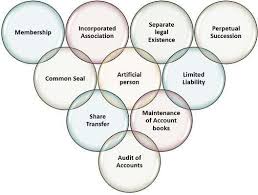There are different definitions of a company in different countries. If we look at the global definition of it, it is said to be a business entity acting as an artificial legal person. A group of persons or a single person forms the company for engaging in or carrying on a business. Thus, it’s like an artificial person that exists in the form of a corporate legal entity. As per the Companies Act 2013 of India, a company is a registered association that has an independent legal entity along with perpetual succession. It is essentially a body corporate that carries limited liability and comprises of a common capital that includes shares that are transferable.

What is Company?
A company is a business organization created by individuals, groups, or organizations to conduct business. It is an artificial legal entity separate from its owners and has a distinct legal identity. It can enter into contracts, own assets and property, sue or be sued in its name, and conduct business activities. Forms of the company include sole proprietorship, partnership, or corporation, and operate in various industries and sectors.
It is formed by filing articles of incorporation or articles of association with the relevant government agency. It outlines the company’s purpose, ownership structure, management, and other details. The ownership of a company is represented by shares, which can be bought and sold on a stock exchange or privately.
It can have one or more shareholders or owners who are not liable for its debts beyond the amount of capital invested. This is known as limited liability and is one of the key advantages of a company. A board of directors usually conducts a company’s management. Also, a group of executives are responsible for making strategic decisions and overseeing the company’s day-to-day operations.
Features of Company
Company is a Separate Legal Entity
A company is a separate legal entity distinct from its shareholders. Even if the total shareholding of a company is purchased by one person or a group of persons acting in concert, the company would still continue to have its separate legal entity. However, a company is not a citizen and cannot claim fundamental rights granted to citizens.
Company is a Juristic Person
Under the Companies Act, the terms person includes not only natural persons but also other juridical people. A company is a juristic person that a person can represent it before a Court of Law or any other place by a person competent to represent it. The power to institute a suit in the case of a company vests with the Board of Directors of the Company and an individual Director can institute a suit only if specifically empowered. However, a company cannot take an oath or make an affirmation. Hence, a company cannot become a witness.
Company has Perpetual Succession
One of the main reasons for incorporating a company is perpetual succession. After a company’s incorporation, it will continue to be in existence until its wound-up. Even in the case of death of a shareholder holding 99.99% of the shares of the company, the company will continue to be in existence.
Decree Against Company & Corporate Veil
A decree passed against a company cannot be satisfied by attachment and sale of properties belonging to other limited companies managed by the same group of Directors. The corporate veil protects the members of the company from the liability of the company.
Company not Liable for Tortuous Act of Employee
A company is not responsible for the negligence or wrongful act of an employee because it is committed at a time when the employee is engaged by the Company. For a company to be liable, it must commit a wrongful act by the employee in the course of business, so as to form a part of it, and not be merely coincident in time with it. Hence, if the employee at the time of incidence is not acting within the course of business but is doing something for himself, then the company cannot be held liable.
Company can Own Property
A company can own property and the assets of the company belong to the company itself and not to its members. However, the members of the company have a right to participate in the assets of the company, which are leftover after winding-up of the company.
Company can be Trustee
A company can be a trustee if it has a permit from the objects clause in the Memorandum of Association of the Company.
Company can be Complainant in Criminal Case
A company can be a complainant in a criminal case through a representative. For a criminal case, the complainant must be a corporeal person capable of making a physical presence in the Court. However, in the case of a company, a natural person who represents the company, for all practical purposes, as the complainant in the case.
FAQs
What is meant by perpetual succession in a company?
As a company is an artificial person recognised by law, it continues to exist in spite of the differences that may arise in the membership of the company. In simpler terms, there are no restrictions on age because it is an artificial person. Thus, perpetual succession means that major factors such as demise, retirement, insanity of any member, bankruptcy, etc., will not impact the status of the company.
How does a company have limited liability?
As the company is existing as a separate entity, the company cannot hold its members liable for the company’s debts. Thus, limited liability means that the company member’s liability is only restricted to the extent of shares or the guarantee amount. The companies hold these shares.
